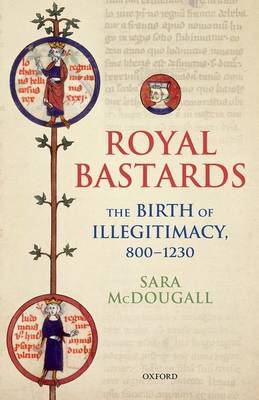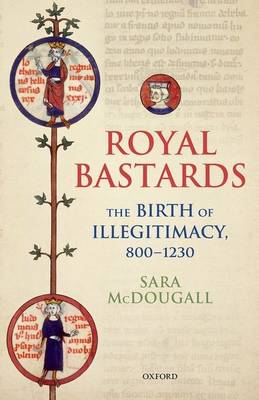
Door een staking bij bpost kan je online bestelling op dit moment iets langer onderweg zijn dan voorzien. Dringend iets nodig? Onze winkels ontvangen jou met open armen!
- Afhalen na 1 uur in een winkel met voorraad
- Gratis thuislevering in België vanaf € 30
- Ruim aanbod met 7 miljoen producten
Door een staking bij bpost kan je online bestelling op dit moment iets langer onderweg zijn dan voorzien. Dringend iets nodig? Onze winkels ontvangen jou met open armen!
- Afhalen na 1 uur in een winkel met voorraad
- Gratis thuislevering in België vanaf € 30
- Ruim aanbod met 7 miljoen producten
Zoeken
Omschrijving
The stigmatization as 'bastards' of children born outside of wedlock is commonly thought to have emerged early in Medieval European history. Christian ideas about legitimate marriage, it is assumed, set the standard for legitimate birth. Children born to anything other than marriage had fewer rights or opportunities. They certainly could not become king or queen. As this volume demonstrates, however, well into the late twelfth century, ideas of what made a child a legitimate heir had little to do with the validity of his or her parents' union according to the dictates of Christian marriage law. Instead a child's prospects depended upon the social status, and above all the lineage, of both parents. To inherit a royal or noble title, being born to the right father mattered immensely, but also being born to the right kind of mother. Such parents could provide the most promising futures for their children, even if doubt was cast on the validity of the parents' marriage. Only in the
late twelfth century did children born to illegal marriages begin to suffer the same disadvantages as the children born to parents of mixed social status. Even once this change took place we cannot point to 'the Church' as instigator. Instead, exclusion of illegitimate children from inheritance and succession was the work of individual litigants who made strategic use of Christian marriage law. This new history of illegitimacy rethinks many long-held notions of medieval social, political, and legal history.
late twelfth century did children born to illegal marriages begin to suffer the same disadvantages as the children born to parents of mixed social status. Even once this change took place we cannot point to 'the Church' as instigator. Instead, exclusion of illegitimate children from inheritance and succession was the work of individual litigants who made strategic use of Christian marriage law. This new history of illegitimacy rethinks many long-held notions of medieval social, political, and legal history.
Specificaties
Betrokkenen
- Auteur(s):
- Uitgeverij:
Inhoud
- Aantal bladzijden:
- 320
- Taal:
- Engels
- Reeks:
Eigenschappen
- Productcode (EAN):
- 9780198785828
- Verschijningsdatum:
- 3/01/2017
- Uitvoering:
- Hardcover
- Formaat:
- Genaaid
- Afmetingen:
- 236 mm x 160 mm
- Gewicht:
- 748 g

Alleen bij Standaard Boekhandel
+ 313 punten op je klantenkaart van Standaard Boekhandel
Beoordelingen
We publiceren alleen reviews die voldoen aan de voorwaarden voor reviews. Bekijk onze voorwaarden voor reviews.











